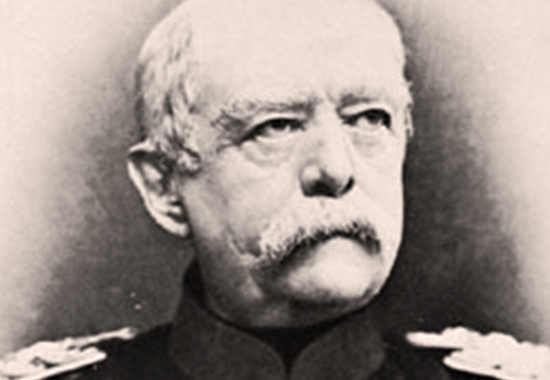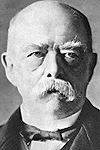|

OTTO VON BISMARCK - CREATOR OF THE
GERMAN EMPIRE
Blood and Iron
Go here for more about
 Otto von Bismarck.
Otto von Bismarck.
Go here for more about
 Bismarck's Blood and Iron speech.
Bismarck's Blood and Iron speech.
It follows an excerpt transcript of
Otto von Bismarck's Blood and Iron speech, delivered at
Berlin, Germany - September 30, 1862.
Go here for the
 German version of this speech.
German version of this speech.

 |
Bismarck responds
to Max von Forckenbeck's lengthy arguments about
appropriation rights and Art. 99 of the
constitution and the people's wish for a
shortened military service: |
He would like to
go into the budget for 1862, though without
making a prejudicial statement. An abuse of
constitutional rights could be undertaken by any
side; this would then lead to a reaction from
the other side.
The Crown for
example could dissolve parliament twelve times
in a row, that would certainly be permitted
according to the letter of the constitution, but
it would be an abuse.
It could just as
easily reject cuts in the budget, immoderately.
It would be hard to tell where to draw the line
there. Would it be at 6 million? At 16? Or at
60?
There are members
of the National Association [Nationalverein] of
this association that has achieved a reputation
owing to the justness of its demands, highly
esteemed members who have stated that all
standing armies are superfluous. Well, what if a
public assembly had this view! Would not a
government have to reject this?
There was talk
about the sobriety of the Prussian people. Yes,
the great independence of the individual makes
it difficult in Prussia to govern with the
constitution or to consolidate the constitution.
In France things
are different, there this individual
independence is lacking. A constitutional crisis
would not be disgraceful, but honorable instead.
Furthermore, we
are perhaps too well-educated to support a
constitution. We are too critical. The ability
to assess government measures and records of the
public assembly is too common. In the country
there are a lot of catiline [conspiratorial]
characters who have a great interest in
upheavals. This may sound paradoxical, but
everything proves how hard constitutional life
is in Prussia.
Furthermore, one
is too sensitive about the government's
mistakes, as if it were enough to say this and
that cabinet minister made mistakes, as if one
wasn't adversely affected oneself. Public
opinion changes, the press is not the same as
public opinion. One knows how the press is
written.
Members of
parliament have a higher duty, to lead opinion,
to stand above it. We are too hot-blooded. We
have a preference for putting on armor that is
too big for our small body. And now we're
actually supposed to utilize it.
Germany is not
looking to Prussia's liberalism, but to its
power. Bavaria, Württemberg, Baden may indulge
liberalism, and yet no one will assign them
Prussia's role.
Prussia has to
coalesce and concentrate its power for the
opportune moment, which has already been missed
several times. Prussia's borders according to
the Vienna Treaties of 1814-15 are not favorable
for a healthy, vital state.
It is not by
speeches and majority resolutions that the great
questions of the time are decided – that was the
big mistake of 1848 and 1849 – but by iron and
blood.
Last year's
appropriation has been carried out, for whatever
reasons, it is a matter of indifference, he
[Bismarck himself] is sincerely seeking the path
of agreement whether he finds it does not
depend on him alone.
It would have been
better if one had not made a fait accompli on
the part of the Chamber of Deputies. If no
budget comes about, then there is a tabula rasa.
The constitution offers no way out, for then it
is one interpretation against another
interpretation. Summum ius, summa iniuria
[Cicero: The highest law can be the greatest
injustice]; the letter killeth.
He is pleased that
the speaker's remark about the possibility of
another resolution of the House on account of a
possible bill allows for the prospect of
agreement. He, too, is looking for this bridge.
When it might be found is uncertain.
Bringing about a
budget this year is hardly possible given the
time. We are in exceptional circumstances. The
principle of promptly presenting the budget is
also recognized by the government, but it is
said that this was already promised and not
kept. And now it's "You can certainly trust us
as honest people."
He does not agree
with the interpellation that it is
unconstitutional to make expenditures whose
authorization had been refused. For every
interpretation, it is necessary to agree on the
three factors.

More History
|